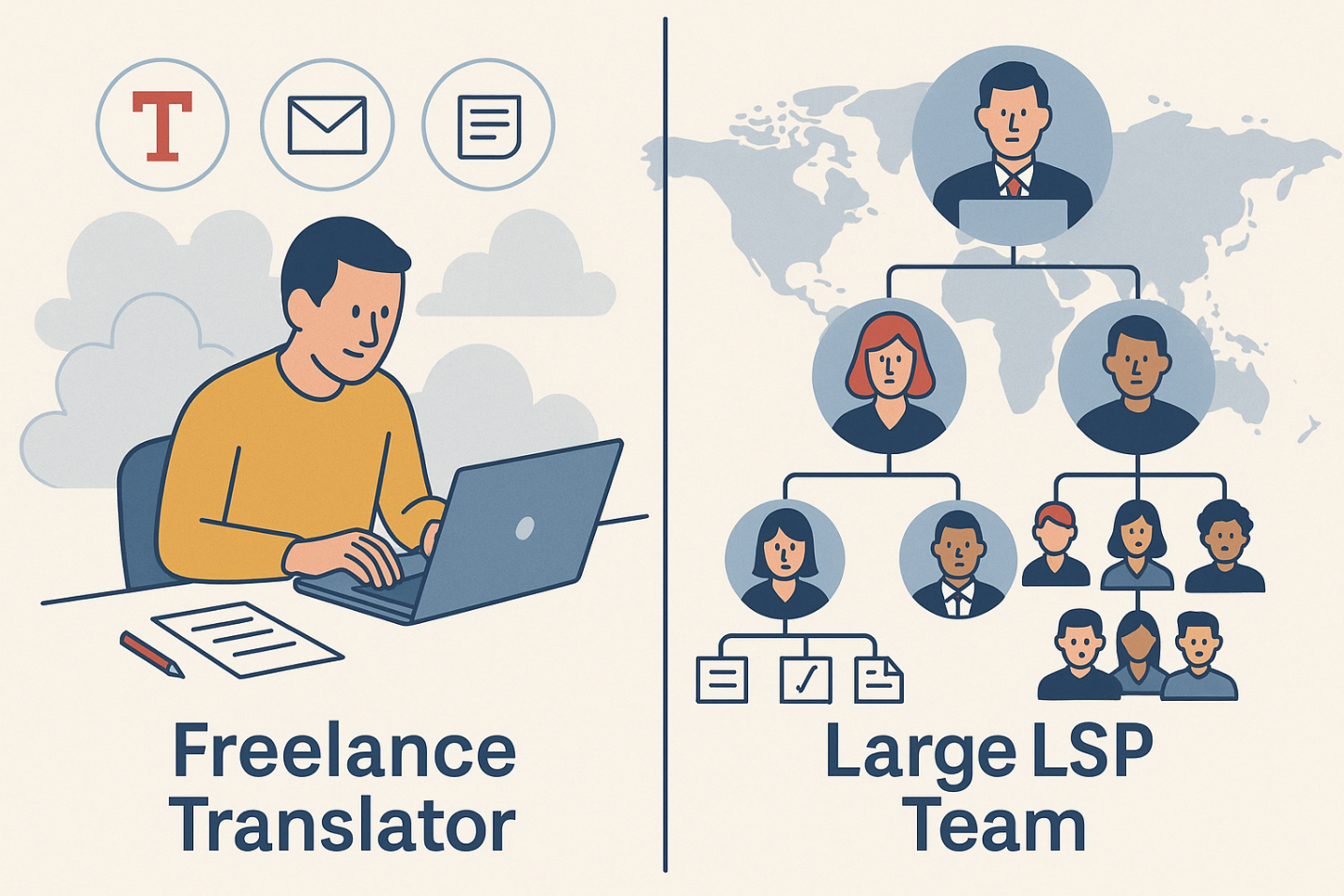In this article, we talk about the current challenges experienced by Ukrainian businesses, translation agencies in particular.
Russia’s invasion of Ukraine is now in its eighth month. During this time, the Russian army, once considered “the second greatest army in the world,” has suffered a series of humiliating defeats. Here are the most high-profile ones:
- Russia was forced to withdraw from several Ukrainian regions it had seized, claiming that it was a “goodwill gesture.”
- It was forced to abandon Snake Island, which it had planned to use as a springboard for an attack on Odesa.
- Ukrainian anti-ship missiles sank the flagship of the Russian Black Sea Fleet, the Moskva cruiser. The Russian authorities, unwilling to acknowledge this highly inconvenient fact, still maintain that the cruiser sank due to a fire caused by “smoking in an unauthorized place.”
- The Ukrainian army liberated the Kharkiv region so quickly that it seized more Russian equipment than the total amount of equipment provided by the Western allies.
- Under AFU pressure, the Russian army was forced to surrender Kherson, the only regional center it had captured back at the start of the war.
The Russian Federation’s military and political leadership has finally begun to understand that Ukraine cannot be defeated on the battlefield. And it has decided to take the war to its civilian population, disabling Ukraine’s energy system and leaving the entire country without electricity and heat.
They have not been completely successful, but they have created serious problems for us, as it is always easier to destroy than to create. Electricity is now supplied in Ukraine according to a schedule of five hours on/four hours off. Every building has a separate blackout schedule.
This is a huge challenge for businesses, and the translation and localization industry is no exception. I will explain how we deal with these problems below.
Portable power stations
The first and obvious challenge is to ensure that the computers used by translators and project managers run smoothly. When there is electricity, we charge the batteries so that there is enough power to keep the translators and project managers working during blackouts. So the first thing we had to splurge on was a portable power station. We opted for the BLUETTI AC300 power station with two B300 battery modules:
.jpg)
Each module can run 20 laptops for 4 hours. If there are fewer than 10 employees in the office, we even treat ourselves to the coffee machine and caffeine up!
Gasoline generators
Portable power stations are a great solution to our blackout problems, as long as electricity is periodically available. But what happens if the power goes out for 10 hours or even a few days at a time?
In this case, we have to generate our own electricity. So we bought a 2.2 kW gasoline generator:

2.2 kW is the maximum power consumed by our battery system when charging. We have not yet needed the generator, and we hope it will remain in its box. However, eight months of war have taught us that we must be ready for anything.
Solar panels
A great option in case gasoline is nowhere to be found. But in a metropolitan area, solar-paneled buildings are not easy to come by. So we only have one solar power system, which is installed on the roof of an employee’s house. It will work as a backup office if we are faced with the worst-case scenario.
Starlink
I have described how we are dealing with the power supply problem. But this is not enough to keep things running smoothly, as, in addition to electricity, we need a stable internet connection. And when we lose electricity, we lose the internet.
When this happens, we switch to 4G mobile internet. But it is slow and unstable, as the traffic in the mobile networks soars. The speed drops to 1–2 Mbit/s, and sometimes we don’t even have any internet connection as the batteries that power the mobile phone operator’s cell towers die.
Since most of our employees require a constant and stable internet connection to be able to work, we’ve dealt with this problem radically by purchasing a Starlink terminal:

Lighting
It is possible to work in the dark, but it is not easy. So we bought some camping lanterns and battery-powered table lamps:

With time, we bought a couple of large LED lights, hung them from the ceiling, and connected them to our power station. So now, our office is almost as light and bright as usual:
.jpg)
Thermos
Our electric kettle consumes around 2 kW. It is an unacceptable waste to connect it to a battery when there is no mains power supply. But sometimes you want to take a break and have a cup of tea. So we bought a 2.5-liter thermos:

This gadget requires a certain amount of self-discipline, as you have to remember to fill it with boiling water when there is electricity. But in time, this becomes a habit.
Heating
Temperatures in Ukraine can drop to minus 20 degrees Celsius in winter. Without indoor heating, we cannot work or do anything. In the worst-case scenario, this could actually happen. Our office is heated by a self-contained electric boiler. Consequently, in the event of a prolonged power cut, the temperature in the office will drop significantly. So a backup source of heating is required that is suitable for a metropolitan area. And in our case, this is a gas boiler:

According to the technical documentation, one gas cylinder should last four full working days. I truly hope that we won’t have to resort to a portable gas heater.
In the worst-case scenario, with minus 20-degree temperatures, the office could be turned into temporary accommodation for the staff.
But we really don’t want to go down that road. It is barely believable in a city of millions in the 21st century... But anything can happen, and we have to be prepared for it.
Logistics and costs
Naturally, many companies have had to take such measures. There are gasoline-powered generators outside all restaurants, coffee shops, and hairdressing salons. The private school my child attends has ordered a powerful 600-kilowatt diesel generator so that the children can study instead of sitting in the dark for 2–3 hours every evening. My local swimming pool also has a generator.
As I write this, the Ukrainian army has liberated Kherson, a regional center with a population of 300,000. The retreating Russian army deliberately blew up all the transformers and left the city without electricity. And until Kherson’s infrastructure is repaired, all the electricity in Kherson will come from generators.
All of this has created a huge demand for generators and batteries, leading to price rises. In fact, demand is so high that we have to make an advance payment and wait 2–3 weeks for delivery.
Ukraine has no functioning seaports (they are blocked by Russia), and everything is imported by road or rail. The shortage of batteries and generators is so great that the Ukrainian government has abolished customs duties on them in an attempt to simplify and speed up the import process.
Morale
For Ukrainian businesses, all the difficulties I have described in this article are part of the struggle for the future of the country, and all the costs are perceived as a painful but necessary sacrifice on our path to victory. We are facing these challenges in the same way that our army is facing daily challenges on the battlefield. These sacrifices give us a sense of belonging to a common struggle.
We therefore completely reject the logic expounded by the Russian state: “Stop resisting, and we will stop destroying your energy system.” We understand that any concessions we make to the aggressor today will come at a much greater cost to us in the future. If the blackmailer’s demands are met, they will see that their threats work, and they will blackmail again, raising the stakes even higher.
We have long understood that the aggressor will be defeated. But our victory has a price that we have not yet fully paid. If we have to work under power shortages to win, so be it. This is not such a high price to pay.
We Ukrainians are keenly aware of how the concessions we agreed to a century ago cost us millions of lives over the following decades.
I have a request
I would like to ask the following of companies that have Ukrainian partners:
- If your Ukrainian partner does not finish a project on time or is slow to respond, please be understanding. Trust me: there are few people in the world who are going to greater lengths to maintain their standards of service and minimize customer inconvenience. We are adapting to the new working conditions, but this does take time.
- Stay with us. Your orders are critical for every Ukrainian, for our economy, and for the country as a whole. This is your contribution to our victory.

.png)



